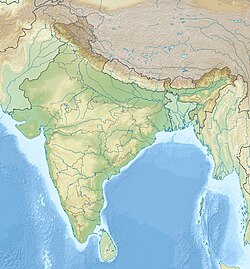Meru Peak
| Meru Peak | |
|---|---|

Meru Peak as visible from Gomukh
|
|
| Highest point | |
| Elevation | 6,660 m (21,850 ft) |
| Prominence | 460 metres (1,510 ft) |
| Coordinates | 30°52′5″N 79°1′56″E / 30.86806°N 79.03222°ECoordinates: 30°52′5″N 79°1′56″E / 30.86806°N 79.03222°E |
| Geography | |
| Location | Gangotri National Park, Uttarakhand, India |
| Parent range | Himalayas |
Meru Peak is a mountain that lies in the Garhwal Himalayas, in the Uttarakhand region of India. It lies between Thalay Sagar and Shivling, and has some highly challenging routes. The name "Meru" likely originated from Sanskrit word for spine, attributing to the shape of the mountain. It is 6,660 metres (21,850 ft) high. It was the site of the world's highest BASE Jump from 'Earth', by Glenn Singleman and Heather Swan from a height of 6,604 metres (21,667 ft) in June 2006 but has since been surpassed by Valery Rozov's 2013 jump from Everest's North Face. The mountain has three peaks: southern (6,660 metres, 21,850 ft), central (6,310 metres, 20,700 ft), and northern (6,450 metres, 21,160 ft). The two higher peaks were climbed earlier than the harder central peak, which was first climbed in a 2001 solo ascent by Valery Babanov, and for a second and third time in 2006.
The Shark's Fin route up the central peak of the mountain has a reputation among mountaineers as one of the hardest routes in the world. It was first climbed in October 2011 by a team consisting of Conrad Anker, Jimmy Chin, and Renan Ozturk, which was recognized also by Guinness World Records as the first ascent of this peak.
...
Wikipedia

